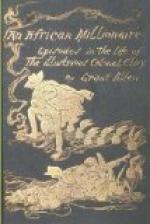“Exactly like myself,” Charles said, finding a point in common. “I’m interested in mines; and I, too, have come over to look after my royalties.”
The poet placed his eyeglass in his eye once more, and surveyed Charles deliberately from head to foot. “Oh,” he murmured slowly. He said not a word more; but somehow, everybody felt that Charles was demolished. I saw that Wrengold, when we went in to dinner, hastily altered the cards that marked their places. He had evidently put Charles at first to sit next the poet; he varied that arrangement now, setting Algernon Coleyard between a railway king and a magazine editor. I have seldom seen my respected brother-in-law so completely silenced.
The poet’s conduct during dinner was most peculiar. He kept quoting poetry at inopportune moments.
“Roast lamb or boiled turkey, sir?” said the footman.
“Mary had a little lamb,” said the poet. “I shall imitate Mary.”
Charles and the Senator thought the remark undignified.
After dinner, however, under the mellowing influence of some excellent Roederer, Charles began to expand again, and grew lively and anecdotal. The poet had made us all laugh not a little with various capital stories of London literary society—at least two of them, I think, new ones; and Charles was moved by generous emulation to contribute his own share to the amusement of the company. He was in excellent cue. He is not often brilliant; but when he chooses, he has a certain dry vein of caustic humour which is decidedly funny, though not perhaps strictly without being vulgar. On this particular night, then, warmed with the admirable Wrengold champagne—the best made in America—he launched out into a full and embroidered description of the various ways in which Colonel Clay had deceived him. I will not say that he narrated them in full with the same frankness and accuracy that I have shown in these pages; he suppressed not a few of the most amusing details—on no other ground, apparently, than because they happened to tell against himself; and he enlarged a good deal on the surprising cleverness with which several times he had nearly secured his man; but still, making all allowances for native vanity in concealment and addition, he was distinctly funny—he represented the matter for once in its ludicrous rather than in its disastrous aspect. He observed also, looking around the table, that after all he had lost less by Colonel Clay in four years of persecution than he often lost by one injudicious move in a single day on the London Stock Exchange; while he seemed to imply to the solid men of New York, that he would cheerfully sacrifice such a fleabite as that, in return for the amusement and excitement of the chase which the Colonel had afforded him.
The poet was pleased. “You are a man of spirit, Sir Charles,” he said. “I love to see this fine old English admiration of pluck and adventure! The fellow must really have some good in him, after all. I should like to take notes of a few of those stories; they would supply nice material for basing a romance upon.”




